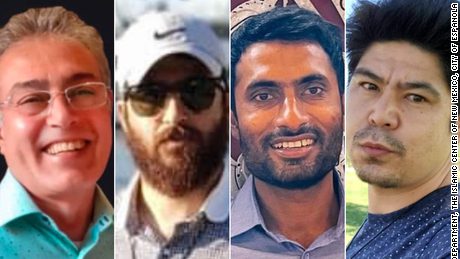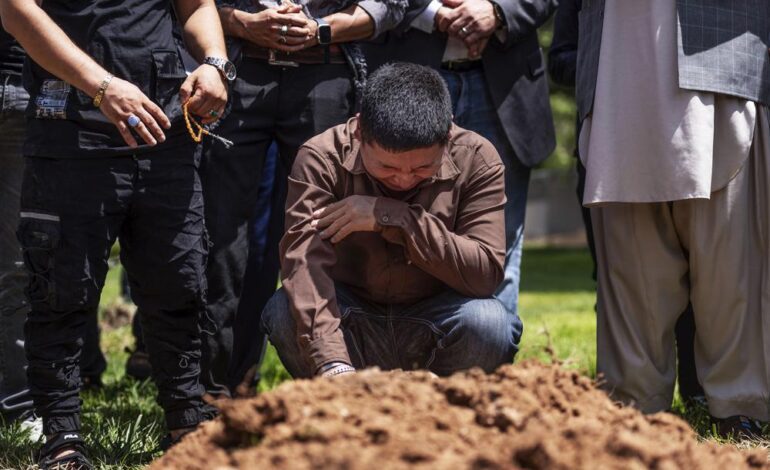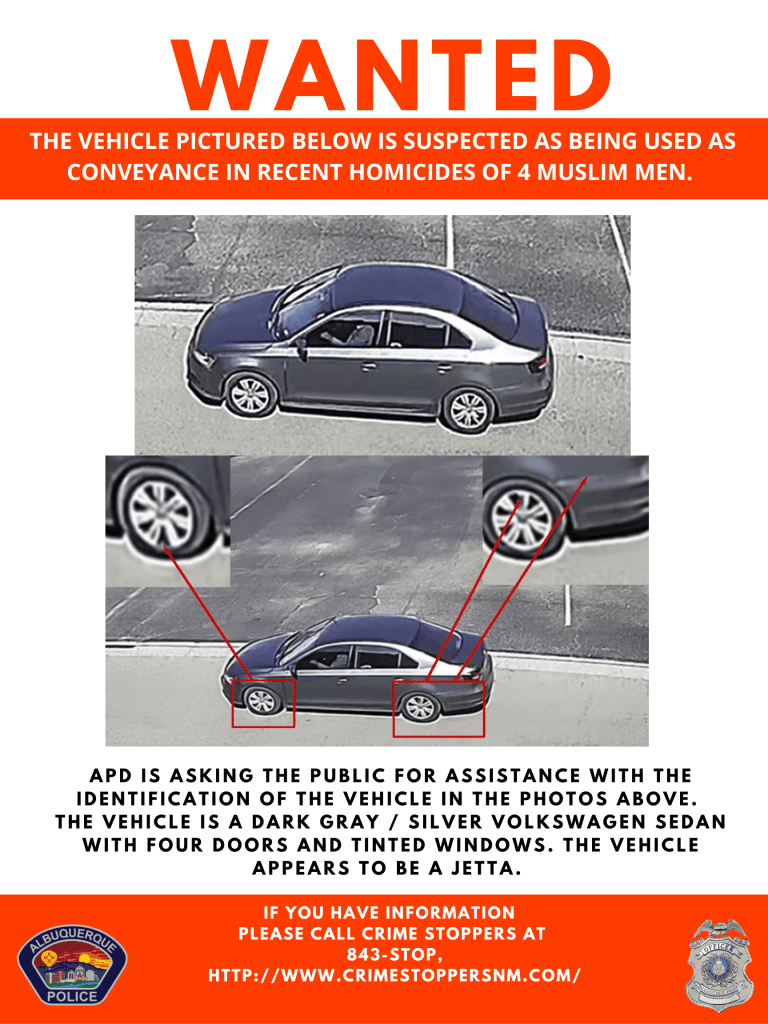On Monday, authorities identified the fourth victim in a series of killings of Muslim men in Albuquerque, New Mexico, as the deaths sent ripples of fear through Islamic communities nationwide.
Three of the slayings happened in the past week. Now law enforcement officials are seeking help finding a vehicle believed to be connected to the killings in New Mexico’s largest city. The common elements were the victims’ race and religion, officials said.
Naeem Hussain was killed Friday night, and ambush shootings killed three other Muslim men over the past nine months. Police are trying to determine if the homicides are linked.
The killings have spread fear beyond New Mexico, where Muslims comprise less than 1 percent of adults in the statewide population of 2.1 million, according to the Pew Research Center.
“The fact the suspect remains at large is terrifying,” Debbie Almontaser, a Muslim community leader in New York, wrote on Twitter. “Who is next?!”
In a phone interview, Almontaser said that a female friend who lives in Michigan and wears the hijab shared with her over the weekend just how rattled she was.
“She’s like, ‘This is so terrifying. I’m so scared. I travel alone,’” Almontaser said.
Hussain, 25, was from Pakistan. His death came just days after those of Muhammad Afzaal Hussain, 27, and Aftab Hussein, 41, who were also from Pakistan and members of the same mosque.
The earliest case involves the November killing of Mohammad Ahmadi, 62, from Afghanistan.
Aneela Abad, general secretary at the Islamic Center of New Mexico, described a community reeling from the killings, its grief compounded by confusion and fear of what may follow.
“We are just completely shocked and still trying to comprehend and understand what happened, how and why,” she said.
Three of those killed attended the center, and the fourth was well-known in the community, Abad said.
Some people have avoided going out unless “absolutely necessary” and some Muslim university students have been wondering whether it is safe for them to stay in the city. The center has also beefed up its security, Abad said.
Police said the same vehicle is suspected of being used in all four homicides — a dark gray or silver four-door Volkswagen that appears to be a Jetta or Passat with dark tinted windows. Authorities released photos hoping people could help identify the car and offered a $20,000 reward for information leading to an arrest.
Investigators did not say where the images were taken or what led them to suspect the car was involved in the slayings. Police spokesperson Gilbert Gallegos said in an email Monday that the agency has received tips regarding the car, but did not elaborate.
“We have a very, very strong link,” Albuquerque Mayor Tim Keller said Sunday. “We have a vehicle of interest… We have got to find this vehicle.”
Gallegos said he could not comment on what kind of gun was used in the shootings, or whether police know how many suspects were involved in the violence.
President Biden said he was “angered and saddened” by the killings and that his administration “stands strongly with the Muslim community.”
“These hateful attacks have no place in America,” Biden said Sunday in a tweet.
The conversation about safety has also dominated WhatsApp groups and email groups that Almontaser is on.
“What we’ve seen happen in New Mexico is very chilling for us as a Muslim minority community in the United States that has endured so much backlash and discrimination” since the 9/11 attacks, she said. “It’s frightening.”
Last year, a poll by The Associated Press-NORC Center for Public Affairs Research conducted ahead of the 20th anniversary of 9/11 found that 53 percent of Americans at the time had unfavorable views toward Islam, compared with 42 percent who had favorable ones. That stood in contrast to Americans’ opinions about Christianity and Judaism, about which most respondents expressed favorable views.
Albuquerque authorities say they cannot determine if the slayings were hate crimes until they have identified a suspect and a motive.
Louis Schlesinger, a forensic psychology professor at John Jay College of Criminal Justice in New York, said bias killings are often perpetrated by a small group of people, typically young White men. A lone perpetrator is rare.
“These are basically total losers by every dimension, whether it’s social, economic, psychological, what have you,” he said. “They’re filled with hatred for one reason or another and target a particular group that they see, in their mind, to blame for all their problems in life.”
Even though two of the Albuquerque victims attended the same mosque, they were killed in separate shootings days apart.
It was not clear whether the victims knew their attacker. Schlesinger said the assailant may have deliberately targeted them one by one.
“It’s easier to kill one person. It’s less risk for yourself getting apprehended,” he said.

Mohammad Ahmadi, Naeem Hussain, Muhammad A. Hussain and Aftab Hussein were killed recently in Albuquerque, New Mexico by what police think may be related cases of involving a single shooter. Photo: Albuquerque Police via CNN
The most recent victim was found dead after police received a call of a shooting. Authorities declined to say whether the killing was carried out in a way similar to the other deaths.
Muhammad Afzaal Hussain had worked as a field organizer for a local congresswoman’s campaign.
Democratic Rep. Melanie Stansbury issued a statement praising him as “one of the kindest and hardest working people” she has ever known. She said the urban planner was “committed to making our public spaces work for every person and cleaning up legacy pollution.”
As land-use director for the city of Española — more than 85 miles (137 kilometers) north of Albuquerque — Hussain worked to improve conditions and inclusivity for disadvantaged minorities, according to the mayor’s office.
The city staff “has lost a member of our family, and we all have lost a brilliant public servant who wanted to service and improve his community,” Española Mayor John Ramon Vigil said in a news release.
– AP report, edited for style







Leave a Reply